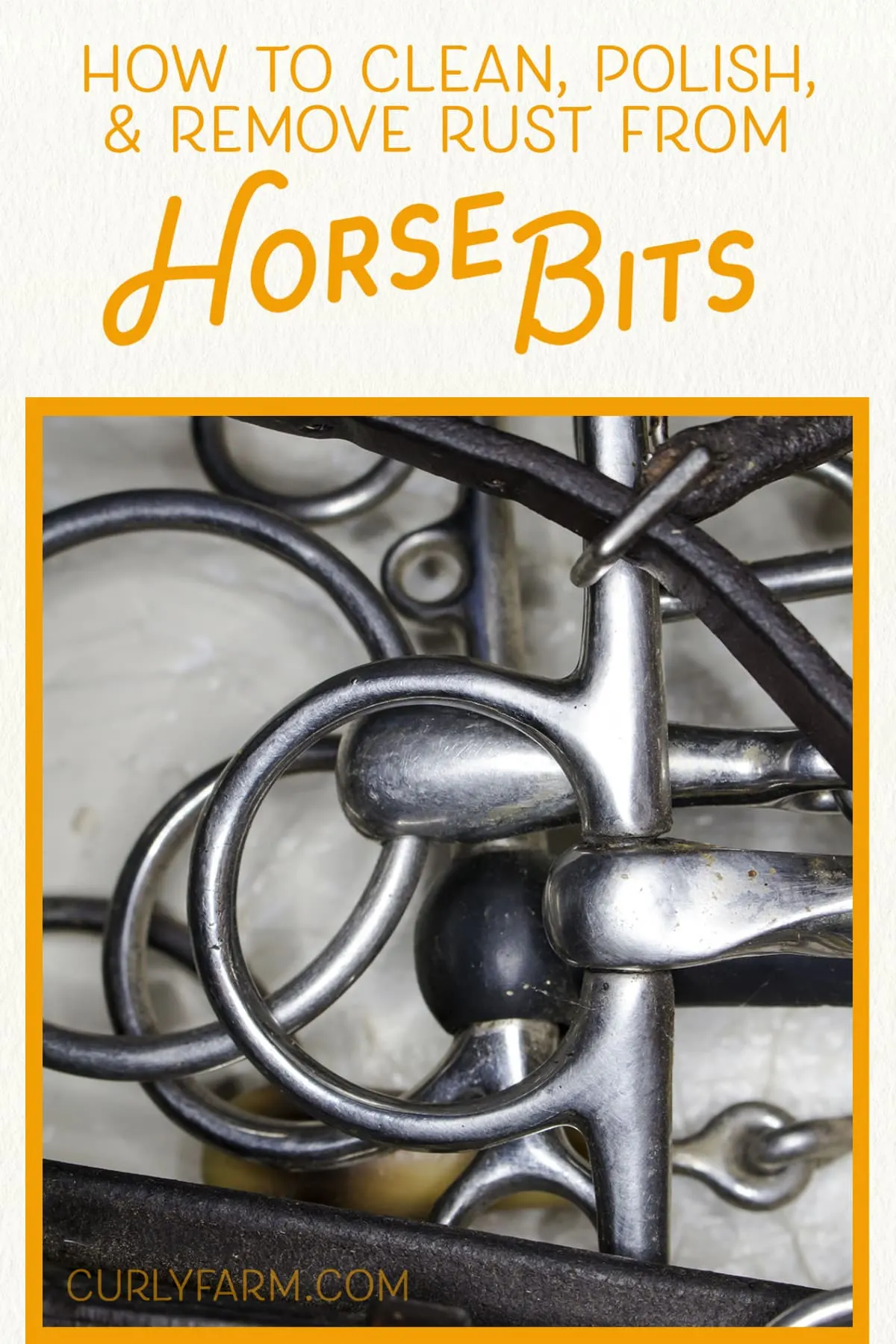Clean, rust-free horse bits serve the purpose of both form and function- that is to say, a clean horse bit doesn’t just look good – it works better. While clean bits might not turn heads in the horse show ring, being well turned out (with polished hardware, dusted boots, and a clean horse) can sometimes be the tiebreaker between first and second place. For horses, clean bits are easier on the mouth, move more freely, and are free from the damage caused by corrosion.
When to Clean Horse Bits
Horse bits should be cleaned when you clean your tack. If you’ve taken your bridle apart for cleaning or oiling, take time to clean, inspect, and polish your bit as well. Always clean bits before switching from using it in one horse’s mouth to another since, like humans, horse saliva can transmit pathogens.

How to clean a horse bit step-by-step
How to clean a horse bit step-by-step
Total Time: 15 minutes
Remove your horse bit from your bridle or headstall
For thorough horse bit cleaning, detach the bit from the bridle or headstall so the bit is completely free from other straps and hardware.
Submerge the bit in a bucket of warm water
After being used in horses’ mouths, most bits have built up residue from horse saliva, chewed hay or grass, or even sweat and dirt. A good soak before cleaning helps to loosen crusted bits. Soaking speeds horse bit cleaning significantly- so don’t skip this step! After soaking, get rid of any remaining deposits with a soft brush or cloth.
Wash the horse bit in the dishwasher
Dishwashers, on a high heat setting, not only clean but also disinfect horse bits with heat. Cleaning your horse bit before using it on different horses can effectively prevent the spread of infectious diseases that can be spread by saliva. With the presoak to loosen debris, the dishwasher should get your bit clean.
If rusty, soak the horse bit in a weak acid solution
Although some bits like sweet iron bits are meant to be rusty, most are not and rust can affect their functioning. Even gentle acids will eat away at rust and remove it from your bit. You can use vinegar, cola, or lemon juice (common acidic solutions in most homes) to soak your bit until the rust dissolves (about two days). To see faster results- in as little as an hour- mix a citric acid solution for soaking.
Inspect the bit
Now, rinse the bit and inspect the surface. Tiny imperfections on the smooth surface of a bit may look minor but can be very uncomfortable or irritating for a horse’s delicate mouth. If you have concerns about pits or pockmarks left behind on the surface of the bit, it’s best to discard the bit and replace it with a stainless steel rustproof equivalent.
Polish the side pieces of the bit
Most metal polishes are not safe to ingest, so don’t polish the mouthpiece of your horse’s bit. However, polishing the sides of your horse’s bit (the external portions and don’t come in contact with the horse’s mouth) can create a high gloss finish that’s just noticeable enough to add sparkle. A polished bit can impres horse show judges.
Reattach your horse bit to the bridle
Once your bit is clean, rust-free, and polished, it’s time to reattach your horse bit to the bridle that you use to ride your horse. If you still have the polishing equipment handy use a bit of metal polish to polish the buckles on your bridle or headstall before storing your bridle or returning it to your tack room.
Supply:
- Warm water
- soft cloth
- metal polish (optional)
- household acidic cleaner like vinegar or lemon juice (optional)
More tips for Horse Bit Cleaning
Preventing rust on horse bits
Horse bits come in a number of different metals including brass, stainless steel, iron, and even copper. However, most inexpensive and moderately priced bits are cheap metal plated with a nickel or chrome finish. Eventually, this plating will fail and the mouthpiece, rings, or cheekpieces may begin to rust.
To prolong the life of horse bits and prevent rusting, store your bits in a low humidity environment. In high-end modern barns, tack rooms are often humidity controlled to prevent mold, mildew, and rust from forming on horse tack. For riders without access to these facilities, there are options! Try storing your bridle in a zippered bridle bag. To keep it dry, toss in a a few moisture-absorbing silica packets (buy them in bulk here). These can prolong the life of horse bits and prevent rust.
The best horse bit cleaner
I think the best horse bit cleaner is very hot water and elbow grease. The best cleaner for cleaning horse bits tends to vary with what you’re trying to clean off the bit: if you’re trying to remove dried foam, sweat, saliva, or even bits of hay or grass, the best cleaner is hot water and a long soak followed by scrubbing with a soft brush or cloth.
On the other hand, that bit cleaning method will not work at all to clean rust off of a horse bit. In that case, the best cleaner for your rusty horse bit is a soak in a weak acid that will break down the rust. If, on the other hand, you just need a quick polish-clean of the visible portions of your bit to prepare for a horse show or inspection, the best cleaner for your horse bit is just a bit of metal polish such as Nevr Dull.
Cleaning antique horse bits
Sometimes, it’s better not to clean old horse bits- the rich patina on metal discolored by age and oxidation may add value to antique horse bits if they are old enough or cool enough to be seen as art objects. If you do decide you would like to clean your old antique horse bits, follow the instructions for new horse bits (provided in our how-to instructions). With care and attention- as long as the bit is not too rusted – many antique horse bits can be restored to usable.
Cleaning corroded copper horse bits
In the past, I’ve been asked how to clean rust and copper horse bits, but true copper horse bits don’t rust- they gather what’s called a “patina’ – which, on copper, is always a greenish-gray hue due to the type of corrosion that occurs on copper over time. To remove corrosion from a copper horse bit, you can use the same method described above for removing rust.
An additional method that works well for cleaning copper horse bits is – believe it or not – ketchup! Ketchup, as a tomato product, is a fairly strong household acid. The paste-like consistency makes it easy to clean three-dimensional objects. Simply spread ketchup over the surface of the corroded copper horse bit and let the bit sit for several hours before, rubbing the surface with a soft cloth and then washing off the ketchup cleaner. What should be left behind is bright, uncorroded copper with a bright finish and no visible patina.
When copper horse bits do rust
Technically, it’s impossible for copper to rust due to the composition of the real copper. That said, many horse bits sold as “copper,” are actually copper or copper-alloy plating on top of a metal that is not rust-resistant. Over time, as plating fails, these bits may rust. To clean these rusty “copper” bits, follow the instructions in this article for cleaning a rusty horse bit.
Cleaning sweat residue from metal horse tack buckles, stirrups, and horse bits
Although a standard dishwasher, with its citric acid-based abrasive wash and high heat, is usually sufficient to remove all but the most stubborn rust and sweat stains, sometimes a hands-on approach is the best way to figure out how to clean a horse bit. If your horse bit comes out of the dishwasher with a residue remaining on the surface, it’s time to pull out the elbow grease and scrub.
Rather than using harsh cleaner (which might not rinse off fully, potentially causing your horse to swallow some of the residue) use a soft cloth and a mild organic abrasive such as baking soda or salt. Mixing a paste of salt and water (or baking soda and water) and scrubbing the residue on the surface of the horse bit is a natural way to really scrub away any lingering grime on the surface of the metal.
Cleaning Brass horse bits
Since brass is an alloy (aka, a mixture) of copper and zinc, it can be cleaned in the same way that copper horse bits can be cleaned – using a soak in a mild household acid like vinegar or lemon juice or using ketchup as an acidic cleaning paste. Good brass horse bits, however, are usable even if they have a light patina, as brass is naturally rust and corrosion resistant and tends to age beautifully. For more information on bits, choosing a bit, and bit maintenance be sure and check out our articles on Pelham Bits and Full Cheek Snaffle BitsHowever, good brass horse bits

